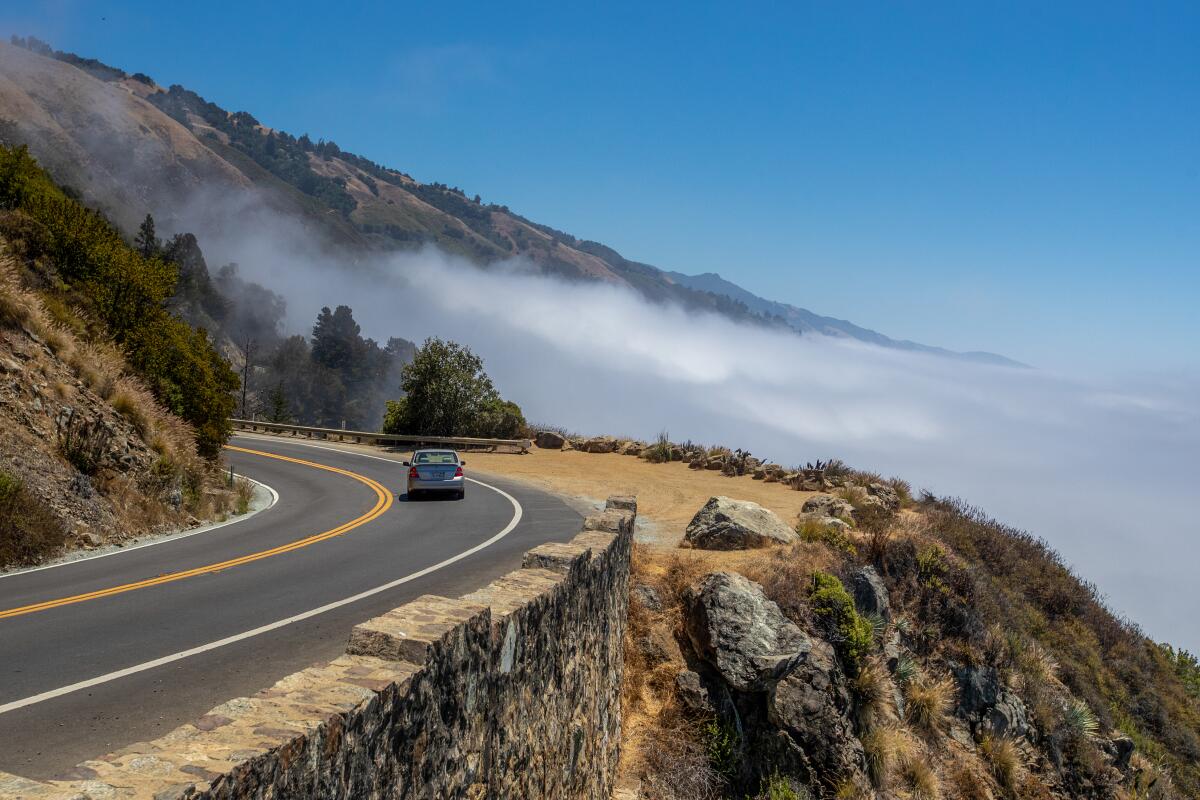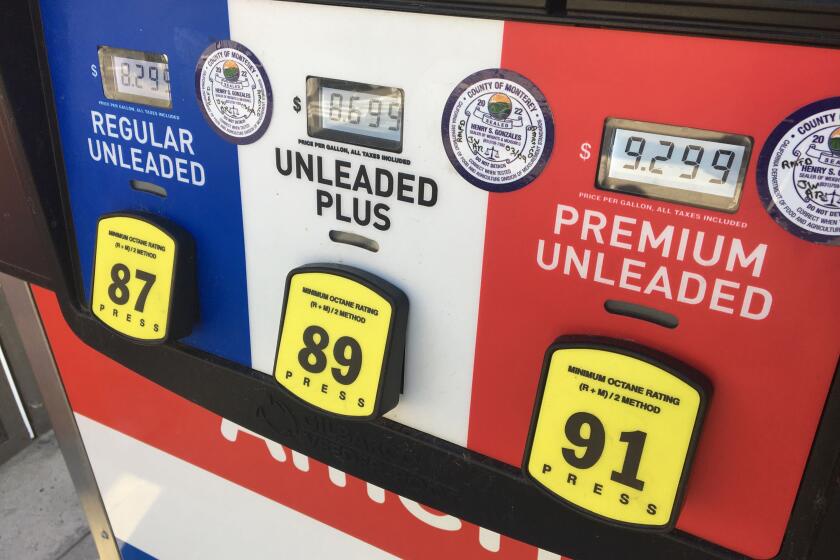News Analysis: In California, the cost of driving has always been a political hot potato

- Share via
SACRAMENTO — Few California cultural touchstones have had more staying power over the years than the state’s affinity for cars and its aversion to taxes.
Both tap into what was long a powerful sales pitch about the good life in the Golden State, where the open road that lies ahead is always better with a little spending cash for a few stops along the way.
Clashes between the two desires can even reshape the political fortunes of the state’s elected leaders. It’s happened before and, in light of the current wrangling over ideas for handing out state tax dollars to cover drivers’ fuel costs, could happen again.
On Thursday, a group of legislative Democrats jumped out in front of negotiations in Sacramento on a cash-back plan to offset the impact of gas prices that have pushed the statewide average to almost $5.79 per gallon. That’s almost one dollar higher than the average at the same time in February, according to AAA, and almost $2 higher than California’s average gas prices in the early spring of 2020.
“We know our constituents are hurting right now,” Assemblymember Cottie Petrie-Norris (D-Irvine), the leader of the group pushing for a $400 rebate to every California taxpayer, said during a Capitol press conference. “We are here to offer help. We are here to deliver solutions.”
The group’s fix would no doubt also offer needed fuel to their political campaigns. Several of the 21 legislators who signed off on the $400 rebate proposal are running in districts this year that were redrawn in ways that are likely to make the electoral season ahead less certain or, in some cases, a toss-up. Two in that group are seeking an open seat in Congress. All would surely benefit from being seen as on the side of drivers and middle- and low-income Californians.
“People are fed up right now,” said Assemblymember Jim Cooper (D-Elk Grove), who’s running for Sacramento County sheriff.
A proposed $400 tax rebate to help Californians deal with high gas prices draws support, but don’t expect to see any checks in the mail next week.
The effort also sidesteps — at least temporarily — the question of whether California’s state-imposed fuel taxes are too high. Republicans, who are searching for relevancy in a state where they are outnumbered and lacking a clear political brand, have been hitting Gov. Gavin Newsom and Democrats hard on their refusal to consider even a short-term suspension of the almost 52-cents-per-gallon state excise tax on gas.
“The Capitol Democrats who refused to suspend the gas tax & take 50 cents off each gallon are having a rough time explaining their vote,” Assembly GOP Leader James Gallagher (R-Yuba City) posted Thursday on Twitter. “People need relief, they aren’t buying your excuses.”
But Newsom did propose gas tax relief in his January budget — a smaller effort to temporarily cancel a scheduled summer increase in the state’s levy. Democratic legislative leaders largely rejected his proposal by urging a broader relief effort. But they might face some complicated political maneuvers ahead now that a group of their own rank-and-file colleagues is pushing for what’s being touted as a rebate equivalent to one state tax-free fill-up of gas every week for one year.
None of it will come cheap. Last month, the independent Legislative Analyst’s Office estimated that a one-cent reduction in California’s excise tax on gas would reduce transportation funds by $175 million. The push for a $400 rebate for all taxpayers — including those without a car — could cost $9 billion, an expense that would likely be paid out of the state’s projected tax surplus.
The question is whether Californians think they need — or deserve — the money more than their government.
In 2003, a furor over taxes and cars toppled the administration of then-Gov. Gray Davis. Whatever weaknesses the Democratic incumbent had before his decision to triple the annual vehicle license fee were nothing compared to the so-called “car tax” anger stoked by Arnold Schwarzenegger, who went on to defeat Davis in that year’s historic recall election.
“This state will once again run on all eight cylinders, rather than one cylinder, as it does right now,” said Schwarzenegger, bellowing into the microphone during one of that year’s final campaign rallies in Sacramento.
Rob Stutzman, who was a senior advisor to Schwarzenegger, said voters saw the fee hike as nothing more than a way to paper over government debt.
“Taxing Californians’ vehicles is akin to taxing an appendage,” he said.
That’s different, perhaps, from the idea of improving roads. More recent Democratic leaders, even when criticized for their views on the size and reach of government, have found ways to detoxify the once dangerous mix of driving and taxation. In 2018, then-Gov. Jerry Brown led a successful campaign to protect a sharp increase in the state’s gas tax enacted by the Legislature the prior year to boost repairs on the state’s roads and bridges.
Brown, who was termed out at that point, boasted on election night that California voters who refused to repeal the 2017 gas tax increase had “voted to tax themselves to pay for what they need” — a political message reinforced by the ubiquitous “SB 1: Rebuilding California” signs at highway construction sites across the state.
But with gas prices now striking many motorists as far beyond fair, the politics could change. In fact, the issue of fairness is one that Democrats seem to have recently latched onto in their rejection of GOP demands for a gas tax holiday.
Their argument: The oil industry won’t reduce prices if the taxes are taken off the table.
“We want to make sure that we’re putting money in the pockets of working families, not in the hands of oil companies and not foreign dictators,” Assemblymember Jesse Gabriel (D-Encino), a rebate supporter, said at Thursday’s event while throwing in a reference to Russian President Vladimir Putin for good measure.
One political weapon Democrats could use in their 2022 campaigns — especially state Atty. Gen. Rob Bonta — are recurring allegations that gas prices are rigged. Bonta, who might face the toughest campaign of any statewide Democrat this year, has oversight of an investigation launched in 2019 by his predecessor, Xavier Becerra, into fuel price-fixing in California. Neither Bonta nor Newsom has drawn attention to the long-forgotten inquiry in recent weeks, even as others insist there’s long been a “mystery surcharge” included in the price of a gallon of gas.
But not all of this year’s incumbents are showing such reticence. U.S. Sen. Alex Padilla, who is running for his first full term in office, said Thursday that he will co-sponsor legislation to impose a new federal tax on large oil companies that would, in turn, produce a quarterly taxpayer rebate.
Expect additional ideas in the days and weeks to come, especially as the road ahead includes the state’s June 7 statewide primary.
More to Read
Sign up for Essential California
The most important California stories and recommendations in your inbox every morning.
You may occasionally receive promotional content from the Los Angeles Times.












